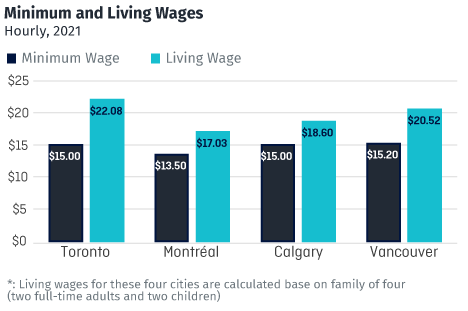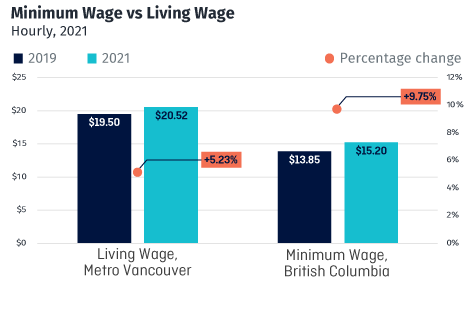“The reality is that a number of families across BC earn less than a living wage and struggle to make ends meet with the rising cost of living, especially the cost of housing.”
Anastasia French, Living Wage for Families BC Organizer
What is the minimum wage?
The minimum wage – the lowest wage rate that an employer is legally allowed to pay its employees – is dictated by labour laws under each provincial jurisdiction in Canada and periodically adjusted for inflation.
The relationship between minimum wage and unemployment is an interesting one, with a faction of economists claiming that minimum wages contribute to unemployment (as some employers cannot afford to pay it), and many other economists arguing that society should not reduce unemployment at the risk of employers paying very poor wages.
The minimum wage in BC has increased from $15.20 per hour in 2020 to $15.65 as of June 1, 2022 (note that some employees such as liquor servers, live-in home support workers and resident caretakers have different minimum wage rates). The province estimated that the increase to $15 per hour positively impacted close to 400,000 British Columbians.
In 2017, the Fair Wages Commission was established to advise the BC government on how to raise minimum wages with increases that are regular, measured, and predictable; ensure fair wages for alternate minimum wage earners such as liquor servers; and examine the discrepancy between minimum wage and living wage.
This article first appeared in the Spring 2022 edition of the Vancouver Economy Report and has been updated with the latest numbers available as of November 2022. Read the report for the full story, plus other articles about Vancouver’s economy.
The historical definition of minimum wage
According to the International Labour Organization, minimum wages have been defined as the minimum amount of remuneration that an employer is required to pay wage earners for the work performed during a given period, which cannot be reduced by collective agreement or an individual contract. Historically, the purpose of minimum wages has evolved from a policy tool to be used selectively in a few low-wage sectors to an instrument of much broader coverage.
What are the limitations and drawbacks of the minimum wage?
Critics of minimum wages argue that they increase prices (and thus contribute to inflation), increase operating costs for business (sometimes to the point where they are no longer viable) and could result in job losses (as businesses cannot afford to hire or retain as many people were no minimum wage to exist).
Other critics have argued that although the idea is a good one in theory, minimum wage rates are often set so low that they do little to improve the quality of life for workers, with the result that many minimum-wage workers still live in poverty. These critiques form the bedrock of the movement for something better to replace minimum wages.
First published in Spring 2022, the graphs below show the discrepancy between minimum and living wages in cities across Canada and in BC. As of November 2022, the [minimum/living] rates are as follows :
- Toronto: $15.50/$23.15
- Calgary: $15.00/$22.40
- Montreal: $14.25/$18.00


Graph 1 Sources: Retail Council of Canada, Living Wage for Families BC, Ontario Living Wage Network, Dailyhive, Vibrant Communities Calgary.
Graph 2 Sources: Living Wage for Families BC, Province of BC
Living wage
The concept of a living wage is distinct from a minimum wage. Whereas minimum wages are the legislated minimums for individual employees, a living wage is the estimated hourly wage that will cover the basic expenses of a family. Basic expenses include food, clothing, rental housing, childcare, transportation and a savings cushion to account for illness or emergencies. In British Columbia, the living wage calculation is based on a two-parent family with two children – the most common family unit in BC – and each parent working full-time.

Source: Calculation Guide, Canadian Centre for Policy Alternatives-BC and Living Wage for Families BC
Living wage in Metro Vancouver
*Update* According to Living Wage for Families BC, the living wage in Metro Vancouver rose 17.3 percent from $20.52/hr to $24.08/hr, the greatest increase since living-wage calculations for BC began in 2008. The spike is attributed to the spike in food costs, which have outpaced the rate of inflation.
As of May 1, 2017, the City of Vancouver became a certified living wage employer of salaried and contract staff and is the largest municipal government in Canada to commit to the living wage so far.
Further reading
- Working for a Living Wage 2021
- The Ups and Downs of Minimum Wage
- Minimum Wages for Those with Alternate Rates in British Columbia
- List of Certified Living Wage Employers in BC
- Fair Wages Commission – Government of BC
How to get involved
Learn more about becoming a living wage employer:



